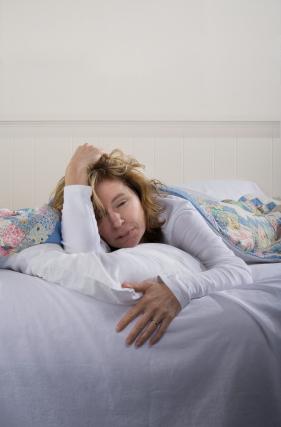
Ill woman in bed Source:iStockPhotos.com Permission: Licensed
If you are thinking about stopping chronic alcohol use, you may want to know some of the alcohol withdrawal symptoms you may experience.
Why People Experience Alcohol Withdrawal
If you drink alcoholic beverages regularly, your body begins to depend on them. Alcohol is a drug and you can become psychologically as well as physically addicted to it. The physical addiction you may experience will cause you to feel ill if you reduce or stop drinking alcoholic beverages.
Alcohol Withdrawal Symptoms: What to Expect
Withdrawal from a drug usually includes psychological symptoms as well as physical symptoms. Psychological symptoms are the feelings you experience from not engaging in the drug use, but they can also include mental changes. Physical symptoms are how your body reacts from the lack of the drug in your system.
Psychological Symptoms
According to the National Institute of Health, you may experience the following psychological symptoms:
- Nervousness
- Anxiety
- Irritability
- Aggression
- Fatigue
- Confusion
- Nightmares
- Mood swings
- Shakiness
- Depression
Physical Symptoms
The National Institute of Health reports that you may experience the following physical symptoms:
- Vomiting
- Nausea
- Seizures
- Clammy skin
- Enlarged or dilated pupils
- Insomnia
- Loss of appetite
- Rapid heart rate
- Headache/migraine
Duration of Symptoms
Everyone responds to alcohol withdrawal differently. On average, it can take up to 72 hours before your body starts to react to the reduction or lack of consumption. The symptoms you experience can last up to ten days.
Warning: You May Need Medical Attention
Some people have severe physical withdrawal symptoms that need medical supervision. This usually occurs with people who have been drinking for many years, whether heavily or moderately. The National Institute of Health advises that people receive medical attention if they experience:
- Hallucinations
- Delirium tremens (mental or neurological changes)
- Black outs
- Chest pains
- Severe confusion
- Fever
Getting Through the Storm
Ten days is a long time to feel ill, especially when you know you can make yourself feel better just by having a drink. Getting through the storm of alcohol withdrawal is extremely difficult for people who have been drinking for a while. It has become a part of your routine and has become a habit. Breaking the habit and getting through the physical and psychological symptoms can seem impossible. Help is available so you don't have to feel defeated by your drug addiction.
Seek Counseling
You may find some comfort and encouragement talking to a therapist about your struggles through the withdrawal process. You may also want to discuss aspects of your addiction such as why you depend on alcoholic beverages, and this can help you succeed in your recovery program.
Find a Sponsor
Find someone you can call when you are feeling tempted to start drinking again. This person should be someone who will be able to inspire and encourage you.
Join Alcoholics Anonymous
Joining Alcoholics Anonymous (AA) can be a great form of support because you can meet others who have been through what you are experiencing. This can give you hope for the future and help you continue on your path to recovery.
Enter a Treatment Center
If you have tried to quit before or you know you won't be able to resist temptation, a treatment center may be an option for you. A treatment center will provide you with a temporary safe environment to receive monitoring of your symptoms, counseling and support from staff and other addicts.
Recovery is a Continuous Process
Once you make it through your alcohol withdrawal symptoms, you may think you have conquered your alcohol addiction. The truth is that many alcoholics will go back to drinking at some point in their life.
Many people drink alcoholic beverages to relieve and cope with stress. This is why recovery from any drug addiction is a continuous process. You may need to continue therapy, attend AA meetings or have someone you can call when you feel tempted to drink again. Don't let yourself go back to where you were before; find the support you need without depending on alcohol.







